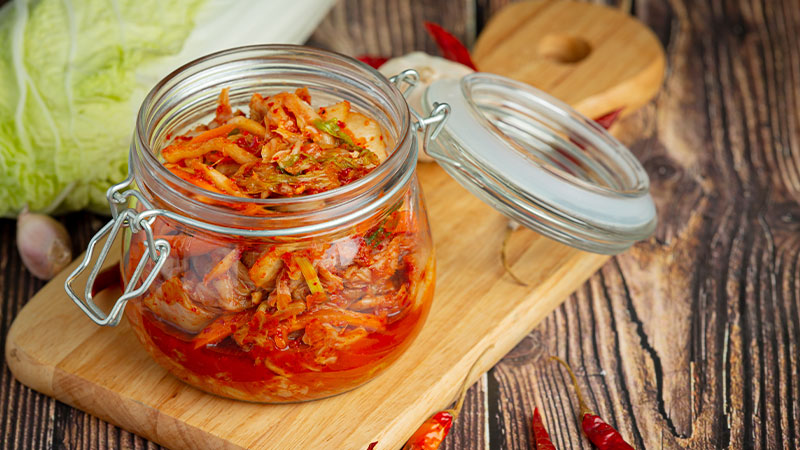
Kimchi, a staple of Korean cuisine, isn’t just a flavorful addition to meals—it’s a nutritional powerhouse.
This traditional fermented dish, primarily made from cabbage and spices, boasts a wealth of health benefits that have earned it the title of a superfood.
Packed with probiotics, antioxidants, and essential vitamins, kimchi supports overall well-being in numerous ways.
Rich in dietary fiber and lactic acid bacteria, kimchi promotes a healthy gut microbiome, which is crucial for digestive health.
The fermentation process enhances its nutrient profile, offering compounds that may help reduce inflammation and boost immunity.
Ingredients like garlic and peppers add to its health-promoting properties, potentially protecting against certain cancers and cardiovascular diseases.
Incorporating kimchi into one’s diet can be a delicious way to enhance health. As more people discover its benefits, this vibrant dish continues to gain popularity beyond its cultural roots, inviting everyone to experience its unique taste and wellness advantages.
1. Packed with Nutrients
Kimchi contains a diverse array of nutrients, providing an excellent health boost. It’s made mainly from Chinese cabbage, a source of vitamins A, C, and K.
This cabbage variety also offers over 34 amino acids and at least 10 minerals. Different batches of kimchi share varying nutritional profiles, but generally, a 1-cup serving includes 23 calories and 2 grams of protein.
The presence of vitamin K supports bone metabolism, while riboflavin aids energy production. Fermentation also enhances nutrient absorption. Kimchi’s ingredients make it a superfood rich in essential vitamins and minerals.
2. Rich in Probiotics
Kimchi, a staple in Korean cuisine, contains an abundance of probiotics due to its lactofermentation process. The bacterium Lactobacillus breaks down sugars into lactic acid, creating an environment for probiotics to thrive.
They support gut health and can aid in treating conditions such as constipation and gastrointestinal issues. Consuming probiotics from kimchi may also benefit heart health and skin conditions.
While the specific advantages of these probiotics need further research, they play a crucial role in kimchi’s health benefits, enhancing digestion and overall well-being naturally.
3. Can Boost Immune Health
Kimchi contains the Lactobacillus bacterium, which can enhance immune health. A study found that mice injected with Lactobacillus plantarum, common in kimchi, showed reduced levels of the inflammatory marker TNF alpha compared to a control group.
Lower TNF alpha levels suggest a more efficient immune response. In test-tube studies, Lactobacillus plantarum from kimchi demonstrated immune-boosting effects.
While these findings are promising, further research with human subjects needs to validate these results. Including kimchi in one’s diet may contribute to immune health due to its probiotic content.
4. Helps Reduce Inflammation
Kimchi contains probiotics and active compounds that can aid in reducing inflammation. Research shows that HDMPPA, a principal compound in kimchi, has anti-inflammatory effects.
In a mouse study, administering 91 mg per pound of body weight (200 mg per kg) daily lowered inflammation-related enzymes.
Another test-tube study confirmed HDMPPA blocked and suppressed the release of inflammatory compounds.
Kimchi’s potential benefits for reducing inflammation are promising though human studies remain limited.
Consuming kimchi may enhance blood vessel health by fighting inflammation, making it a valuable addition to a balanced diet.
5. May Promote Healthy Aging
Chronic inflammation links to various illnesses and speeds up aging. Kimchi, a Korean dish, may slow this process.
Human cells treated with kimchi showed increased viability, indicating better health and an extended lifespan, regardless of age, in test-tube studies.
The potential anti-aging benefits of kimchi could be significant. However, extensive research remains necessary before it becomes a recognized anti-aging treatment.
6. Can Help Prevent Yeast Infections
Kimchi’s probiotics may aid in preventing yeast infections. When the Candida fungus multiplies excessively, a yeast infection occurs. In the United States, over 14 million individuals deal with this condition annually.
Studies indicate that certain Lactobacillus strains combat Candida. One test-tube study highlighted strains from kimchi exhibiting antimicrobial properties against this fungus.
The Candida fungus shows signs of antibiotic resistance, prompting research into natural remedies. Although promising, further studies are necessary to confirm these findings.
7. Supports Weight Management
Kimchi aids weight management with low calories, making it an ideal addition for those watching their caloric intake.
Research shows its ability to reduce body weight and body mass index (BMI) over a 4-week period among 22 participants with excess weight.
Fermented kimchi displays a significant impact. People consuming fermented varieties experienced greater improvements in blood pressure and body fat percentage compared to those eating fresh versions.
The fermentation process in kimchi contributes to these effects due to probiotics and high fiber content. Its benefits extend to potentially lowering blood sugar levels.
8. Benefits Heart Health
Kimchi may reduce heart disease risk. Its anti-inflammatory properties target inflammation, an underlying heart disease cause.
Studies in mice showed lower blood and liver fat levels with kimchi extract. Suppressing fat growth helps prevent heart issues.
Another study with 100 participants consuming 0.5–7.5 ounces daily demonstrated decreased blood sugar and cholesterol levels.
Lowering total and LDL cholesterol reduces heart disease risk factors. Though promising, these findings require further human research for conclusive proof.
9. Simple to Prepare at Home
Making kimchi at home involves straightforward steps and easily accessible ingredients. They can gather fresh vegetables like cabbage, carrots, and radishes.
Combine ginger, garlic, rice flour, chili oil, chili powder, and fermented shrimp into a paste. Follow the fermentation process for days until it reaches a desired sourness.
It’s customizable for different tastes by adjusting the pepper flakes or omitting fish sauce for a vegan option.
This flexibility makes it easy for anyone to enjoy this nutritious food. Letting the kimchi ferment ensures it’s ready to deliver probiotics and enrich daily meals.
